- Home
- Vicki Delany
Scare the Light Away
Scare the Light Away Read online
Scare the Light Away
Scare the Light Away
Vicki Delany
www.vickidelany.com
Poisoned Pen Press
Copyright © 2005 by Vicki Delany
First Edition 2005
Library of Congress Catalog Card Number: 2004115095
ISBN: 1-59058-141-5 Hardcover
ISBN: 9781615950447 epub
All rights reserved. No part of this publication may be reproduced, stored in, or introduced into a retrieval system, or transmitted in any form, or by any means (electronic, mechanical, photocopying, recording, or otherwise) without the prior written permission of both the copyright owner and the publisher of this book.
Poisoned Pen Press
6962 E. First Ave., Ste. 103
Scottsdale, AZ 85251
www.poisonedpenpress.com
[email protected]
Dedication
For Carol May Lem (1953-2004) dear sister-in-law and enthusiastic supporter of my writing and Doug Cargo a good brother and an excellent unofficial publicist
Many thanks to Wendy Solway, Karen Mitchell, Julia Vryheid, and Gail Cargo, good friends, beloved mother, and unofficial editors.
Contents
Dedication
Chapter 1
Chapter 2
Chapter 3
Chapter 4
Chapter 5
Chapter 6
Chapter 7
Chapter 8
Chapter 9
Chapter 10
Chapter 11
Chapter 12
Chapter 13
Chapter 14
Chapter 15
Chapter 16
Chapter 17
Chapter 18
Chapter 19
Chapter 20
Chapter 21
Chapter 22
Chapter 23
Chapter 24
Chapter 25
Chapter 26
Chapter 27
Chapter 28
Chapter 29
Chapter 30
Chapter 31
Chapter 32
Chapter 33
Chapter 34
Chapter 35
Chapter 36
Chapter 37
Chapter 38
Chapter 39
Chapter 40
Chapter 41
Chapter 42
Chapter 43
Chapter 44
Chapter 45
Chapter 46
Chapter 47
Chapter 48
Chapter 49
Chapter 50
Chapter 51
More from this Author
Contact Us
Chapter 1
I stood outside the hardware store at the unmarked intersection. Not because I was curious but merely as an excuse to delay the inevitable, I had pulled into the far corner of the dusty, deserted parking lot. Reaching into the back seat, I snapped the leash onto Sampson’s collar. She hadn’t liked the flight in the least, but in true doggie fashion all was forgotten and forgiven and she bounced from one side of the car to the other with enthusiasm, eager for a stretch, a long satisfying pee and a good sniff.
It was three o’clock on a Saturday afternoon in early May. Surely someone should be around. After letting Sampson sniff to her heart’s content, I filled her water bowl, put her back into the SUV, and walked over to the hardware store. The sign above the door still said Fawcett’s Hardware, exactly as it had when I stood outside in the dust clutching my purse, my single suitcase and my ticket, waiting for the bus that would take me away from Hope River to a new life. But the store itself had been painted recently so that it was bright, cheerful, welcoming in a way that the old Fawcett’s had never been. A row of neatly trimmed shrubs lined either side of the front door. Coming closer I could see that the door with its bright new wood and clear varnish bore a hand-printed sign: Closed for family emergency.
A couple of bunches of wilted carnations tied in thin red ribbons lay across the step. It was the sort of thing you increasingly see these days on roadsides, marking places of accident and death. I’ve never thought that rotting flowers make a very nice memorial. A greeting card missing its envelope had been tucked into the doorframe. I wasn’t interested enough to read it.
Sampson’s massive head hung out the window of the SUV and she started to whine, using all of her formidable powers of persuasion to lure me back into the driver’s seat.
I started up the SUV and slipped a Bruce Springsteen CD into the player. I love to drive to the sounds of The Boss and as I got closer to my family home I’d need something to keep my courage up.
I pulled out onto the dirt road.
It wasn’t far from the hardware store at the intersection of the highway on down the old road to my family home, but I drove slowly. You never know when you might meet an oncoming car traveling much too fast for these narrow country lanes.
Never is a long time. Much longer than it appears to a young girl standing on the cusp of womanhood and the wide world that lies beyond her front door. I hadn’t driven down these roads for nearly thirty years. Since the day I stared out of the filthy, bug splattered window of the bus bound for Toronto, and swore that I would never return. A promise I have kept—until today.
All too soon, I arrived. I sat in the car for a few minutes, looking around and gathering a bit of strength. This was the same house that lived in my memories, although the paint was fresher and a different color, a nice natural gray. The trees were taller and the shrubs bushier. Masses of early-blooming crocuses flowered in neat beds under the living room window, and the tulips around the ancient white pine in the center of the yard poked the tips of their eager green heads out of the warming soil.
It had been a small house when I was growing up, and seen through my adult eyes it appeared smaller still. Tiny, nondescript, clinging to a rough patch of the Canadian Shield as if it would give up the struggle and slide across the road and into the lake given half a chance. As a child, I’d read about a village swallowed up by a mudslide—the whole town sinking downward to disappear from view forever. I’d half hoped the same thing would happen to my house.
I looked at the property with my big-city eyes, but those same eyes that dismissed the old building surveyed the grounds: thick stands of white and jack pine and maple trees as big as they could possibly grow in the temperate climate they loved. All of them strong and healthy, their thick roots burrowing into the underworld of rocks and soil, tendrils reaching for every bit of good, dark earth they could find. On the other side of the private road that ran in front of the house and continued on up the hill lay a wide panorama of blue lake. The light danced on tiny waves to reflect the yellow sun, as large and bright as in a finger painting carried proudly home from nursery school by a truly happy child.
Finally I opened the car door and climbed out. Sampson disappeared into the woods in an instant. The poor squirrels and chipmunks didn’t know what was coming.
I don’t know what sort of welcome I was expecting—but certainly not that I was going to be ignored.
The phone in my parents’ house hadn’t been answered by human or machine, so I’d left a message on my sister’s voice mail with my flight information and time of arrival. Yet no one came out to greet me.
In the recesses of my mind I heard frantic barking and was aware that Sampson had found some tiny animal with which to play hunter.
A new brick walkway led from the drive to the house. I placed my feet carefully on the bricks and remembered the rhyme we would chant when we were children: Step on a crack, break your mother’s back.Did the rhyme apply to brick? Probably not. But no need to worry now, my mother’s back was beyond breaking. Terracotta pots lined the pathwa
y, standing abandoned in the spring sunshine with only a few cracked, dead, brown branches stretching up out of the dry soil as if reaching for a last desperate chance at life.
A deck had been added to the front of the building, a wide wrap-around deck made of blond wood and Plexiglas siding. It was lovely, but this early in the year it stood empty. No deck chairs or sun umbrellas or low tables or pitchers of colorful cocktails or glass bowls full of peanuts and pretzels.
I brushed a touch of moisture from my eye. Spray off of the lake, perhaps, although it was not a windy day.
“Becky.” The voice cracked with age.
My father stood by the open door, unmistakable even after the wear of thirty long years. Of course his jet-black hair was now solid gray, his handsome face sunken and lined, his body stooped with age. His blue eyes burned with more intensity than I remembered.
“Becky. You’re here.”
“Yes, Dad. I’m here. Didn’t Shirley tell you to expect me?”
“Don’t think so. But I’m glad, so glad, that you’re here.”
We looked at each other for a few seconds. I simply didn’t know whether or not to hug him. The moment passed as Sampson burst out of the undergrowth and bounded up the steps of the deck. She bared her formidable teeth and the hairs on the back of her neck rose in a stiff row.
“Sampson. Stop it. Back off.” I snapped my fingers and growled low in my own throat. She sunk to her quivering haunches and slithered back down the steps to stand at my side.
“Sorry about that,” I said to my father. “This is Sampson. She’ll be friendly once she gets to know you.”
He almost smiled. Almost, but not quite. “No need to apologize, Becky. It feels rather nice—been a long time since anything or anyone considered me to be a threat. But you must have luggage, let me help you bring it in. You can have your old room. Won’t take me a minute to make it up.”
“My name is Rebecca, Dad. No one calls me Becky anymore.” I walked up the steps, my heart pounding in my chest. Sampson sniffed at my father’s outstretched hand and wagged her bushy tail in friendship.
“You didn’t know I was coming?”
“No.”
“I called Shirley, left a message.”
“Maybe she told Jimmy and he forgot to tell me.”
“Sounds like Jimmy.”
“Why’s your dog got a boy’s name? If it’s a female?”
“Ray named her. I don’t remember why.”
“Real sorry to hear about his death.”
“Thanks, Dad.”
I shouldn’t have been surprised that my family home had changed. But I was. The furniture was not only more modern, but nicer, more expensive than the junk sale rejects that filled it in my childhood. A giant-screen TV and facing leather lounge chair dominated the room. The formerly dark, pokey kitchen was bigger and full of light. The back wall had been pushed out a few feet and wide windows installed. The wallpaper was bright and cheerful, the new backsplash crisp and white. But the same old fridge and stove. Avocado green.
“You made some changes,” I said. “Looks nice.”
“But we’ve kept your room the same.”
If I hadn’t taken a firm hold of Sampson’s collar and held her close I would have fainted as my father pushed open the door and stood back to let me go first. For the room was the same, the very same. As if they’d kept it as a shrine to me all these years. The few ribbons I’d won in track and field at school were still pinned to the corkboard. My academic awards, now tattered and fading to yellow in cheap frames. The posters of rock and roll bands whose names I could no longer remember.
Sampson whimpered and nuzzled my thigh. She had been Ray’s dog, no doubt about that. But when he died, she and I (the human full of rage, the dog merely grief-stricken) sought solace in each other and she was now attuned to my every emotion.
I dug my fingers into her thick ruff. “Jesus, Dad.”
“You must want to wash up after your long trip. Is your luggage in your car? I’ll bring it in.”
“I can’t stay here, Dad,” I said. “I’ll take a room at a motel or something. I passed a place on the highway, not far back.”
“A motel? You can’t, Becky, ah, Rebecca. Goodness. I can’t expect my daughter to stay in a motel.”
“I’d rather not sleep in this room, Dad. Maybe I shouldn’t have come.”
“You can have our old room—what was your mother’s and mine.”
“I can’t kick you out of your own bed.”
He laughed. My dad’s laugh was always the best—deep and hearty and full of fun. If only we children had heard it more. “It’s not my bed any longer. We expanded Jimmy’s old room years ago. When we put on the addition at the back. Your mom and I bought a big new bed and moved in there. I haven’t slept in the front room in years. Your mother calls it the guest room.”
“I don’t know. I don’t want to impose…”
“Rebecca. You’re my daughter. It’s no imposition. I’m glad you’re here.” He looked at me, wide-eyed, asking me to stay.
Sampson whimpered and wiggled out of my grip. “Okay, Dad. I’ll take the room.”
He beamed.
Together we went to get my things out of the car. Human tensions passed, for now, Sampson scurried around the property, trying her best to sniff every bush and every tree, stopping now and again to pee at a spot of particular interest. Dad exclaimed over the size of the vehicle while I pulled out my single traveling bag. I fly a great deal on business, and if I have managed to accumulate one skill in this life, it’s that of avoiding the perils of checked luggage by packing light.
“Where’s… Mom?” I asked, choking on the words.
“Watson’s.”
“The place in North Ridge? Are they still in business?”
“Old man Watson’s grandson took over when he retired. People round here trust what they know.”
“I stopped at Fawcett’s on the way up. To give the dog a stretch. Does the family still own the store?”
“Nope. Bought by the Taylor family.” He clicked his tongue against his teeth and made a tisk-tisk sort of sound. “Terrible business that Taylor girl.”
I wasn’t the least bit interested in the juvenile antics of the daughter of some small town hardware store owner.
But I should have been.
Chapter 2
The Diary of Miss Janet Green. July 17, 1943
Today, I met HIM. HE is the most wonderful, perfect, handsomest, smartest man in the entire world. I am IN LOVE. Is it mere happenstance that only last week I received this diary from Aunt Joan for my 17th birthday? It can’t be. I am sure that I was meant to start the rest of my life in the pages of this very book.
I went with Jenny; she practically had to drag me there. To the dance they put on in Woking for the Canadians. I had nothing at all suitable to wear. Aunt Betty fussed; she even dragged out one of her old hats for me. Horrid thing. I’m sure she has owned it since the last war. I stuffed it inside the Robinsons’ hedge and fetched it again on my way home. I didn’t want to go to the dance. I always feel so awkward and uncomfortable—so tall—at those things: all the girls lined up against one wall, drinking tea or lemonade, the soldiers watching us, most of them as shy as we are, some of them nipping outside regularly for something stronger than lemonade. Everything made worse of course, by the simple fact that Jenny, of the long golden hair, the huge green eyes and figure I once heard called ‘ripe’ was the prettiest girl within twenty miles.
I might not have gone had Jenny not begged me. She might be pretty, but even she couldn’t go to a dance alone. And poor Mary Jones is confined to bed with the flu.
I might not have gone!!!!! It doesn’t bear thinking about.
I promise that I will write in this diary as often as I can for the rest of my life.
Wednesday, August 4, 1943
Bob called on us today. He came for tea and to meet Aunt Betty and Dad. Dad even closed up the shop for a while so as to be home at tea
time.
Nancy Young, who always helped out at the shop, has turned 18 and it’s time for her to be conscripted. Her mother wanted her to join the Women’s Land Army and stay close to home, but she didn’t want to do that (neither would I, if I had HER mother!) so she went up to London for a factory job, Dad said. I heard him tell Aunt Betty later, when they didn’t know I was listening, that to his mind Nancy was looking for trouble. Mary Black joined the Land Army. She’s gone off to Yorkshire to work on a farm. I will have to do something when I turn 18, although they might let me stay on at the factory if they think that what Barnum and Son is making is important for the war effort. I’m just the junior secretary, but only last week Mrs. Bradley told Mr. Barnum what a big help I am. I have been thinking I might like to join the Land Army too. It must be a lot more fun than stodgy old Barnum and Son and it’s important work. Very important, Mary told me. If we all starve then the Germans can take over England without firing a shot.
But now I don’t want to go. I want to stay here with Dad. Near Bob.
Aunt Betty did a nice bit of a cake with some of the sugar rations she’s been saving up. There were only a few tiny currants, but it was so nice to have a proper cake. Bob ate every bit on his plate and then accepted more when Aunt Betty offered.
He is so wonderfully handsome. I love his accent. It’s ever so smart and sophisticated. He told Dad and Aunt Betty all about his family farm in Ontario (it sounds just huge, with lots of cattle and miles and miles of wheat fields). Dad enjoyed having him here. They went for a walk out to the yard after tea with their cigarettes and to look at the coop Dad built for the chickens Aunt Betty has taken to raising for the eggs. It must be so nice for Dad, to have a young man to talk to, again.
And it’s so nice for me!!!! Bob asked me if I would go with him to the dance next Saturday. I pretended to think very hard as if I had something else planned. Then of course, I said ‘Yes’. It will be wonderful. He is so handsome, and it isn’t just the uniform either. He is much more handsome than any of the other soldiers that were at the dance, or the ones that I see around the village. I only wish he wasn’t quite so short. The man should always be the taller in any couple. But at least he’s strong. He looks to be very big underneath his uniform shirt. That makes him look taller, so it’s perfectly all right.

 Silent Night, Deadly Night
Silent Night, Deadly Night Coral Reef Views
Coral Reef Views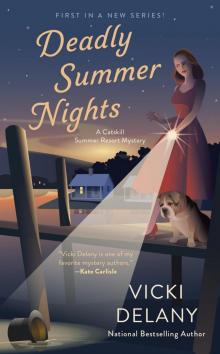 Deadly Summer Nights
Deadly Summer Nights Murder in a Teacup
Murder in a Teacup Whiteout
Whiteout Dying in a Winter Wonderland
Dying in a Winter Wonderland Tea & Treachery
Tea & Treachery Rest Ye Murdered Gentlemen
Rest Ye Murdered Gentlemen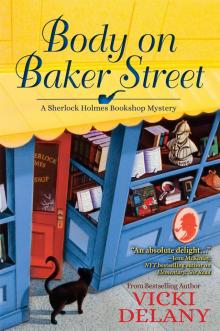 Body on Baker Street: A Sherlock Holmes Bookshop Mystery
Body on Baker Street: A Sherlock Holmes Bookshop Mystery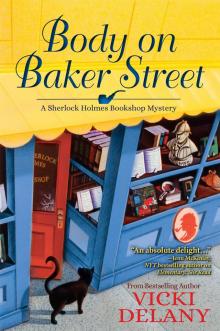 Body on Baker Street
Body on Baker Street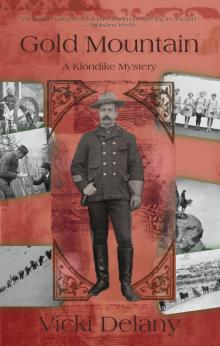 Gold Mountain
Gold Mountain Blue Water Hues
Blue Water Hues Hark the Herald Angels Slay
Hark the Herald Angels Slay Murder at Lost Dog Lake
Murder at Lost Dog Lake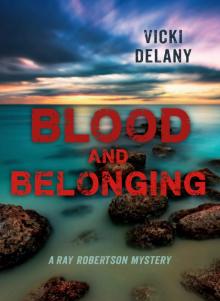 Blood and Belonging
Blood and Belonging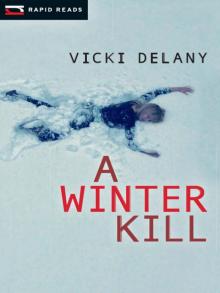 A Winter Kill
A Winter Kill White Sand Blues
White Sand Blues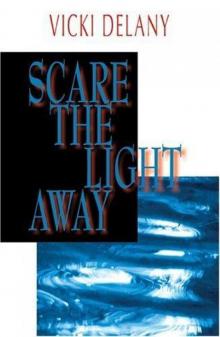 Scare the Light Away
Scare the Light Away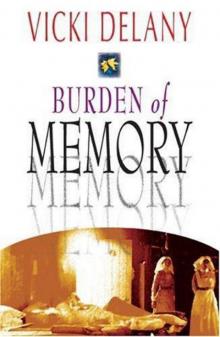 Burden of Memory
Burden of Memory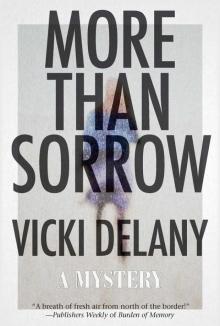 More Than Sorrow
More Than Sorrow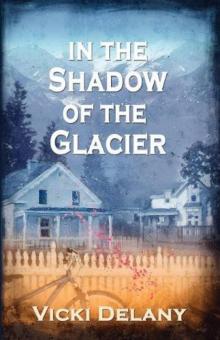 In the Shadow of the Glacier
In the Shadow of the Glacier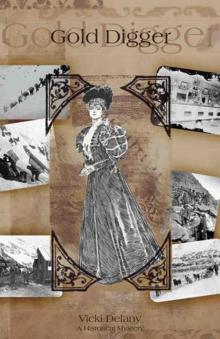 Gold Digger: A Klondike Mystery
Gold Digger: A Klondike Mystery Gold Web
Gold Web Haitian Graves
Haitian Graves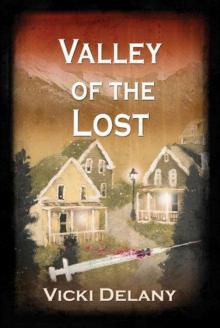 Valley of the Lost
Valley of the Lost We Wish You a Murderous Christmas
We Wish You a Murderous Christmas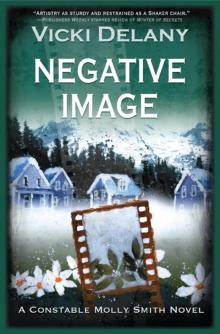 Negative Image
Negative Image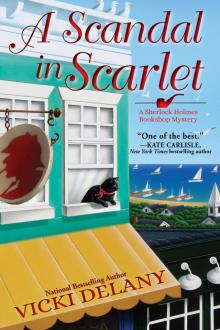 A Scandal in Scarlet
A Scandal in Scarlet Juba Good
Juba Good Winter of Secrets
Winter of Secrets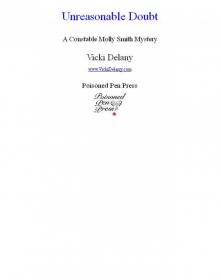 Unreasonable Doubt
Unreasonable Doubt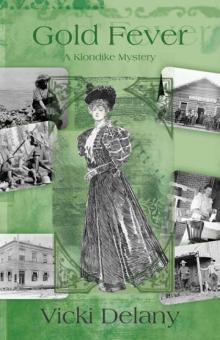 Gold Fever
Gold Fever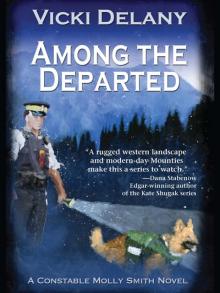 Among the Departed
Among the Departed Elementary, She Read: A Sherlock Holmes Bookshop Mystery
Elementary, She Read: A Sherlock Holmes Bookshop Mystery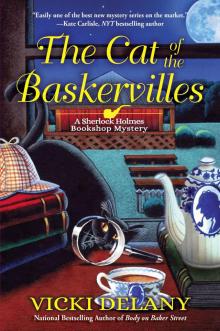 The Cat of the Baskervilles
The Cat of the Baskervilles